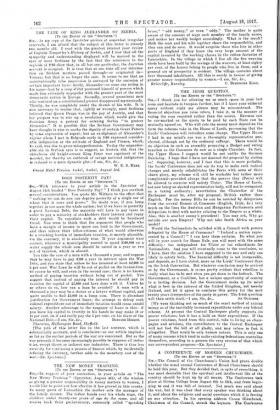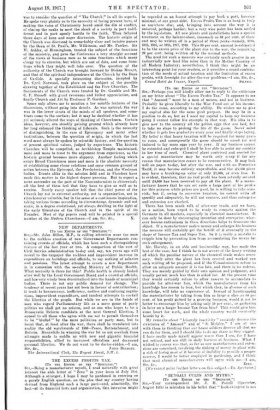A CONFERENCE OF MODERN CHURCHMEN.
[To TM EDITOR Or ran " SPECTATOR.") SIE,—The Council of the Churchmen's Union had grave doubts whether the usual annual Conference of Broad Churchmen should be held this year. But they decided that, in spite of everything, it was most desirable that the spiritual and intellectual life of the country should be kept up by all means. The Conference took place at Girton College from August 8th to 13th, and from begin- ning to end it was full of interest. Not much was said about the war, but it was clear that every speaker was thinking about it, and about the religious and social questions which it is forcing on our attention. In his opening address Canon Glazebrook, Chairman of the Council, struck the keynote. The Conference was to consider the question of " The Church," in all its aspects. He spoke very plainly as bathe necessity of facing present facts, of making the. voice of Christianity heard amid the din of conflict, of closing the ranks to meet the-shock of a society iu part indif- ferent and in part openly hostile to the faith. Then followed three days of keen and eager discussion. The historic origin of the Church was discussed in remarkably clear and incisive papers by the Dean of St. Paul's, Mr. Wilkinson, and Mr. Fawkes. Sir W. Ashley, of Birmingham, treated the subject of the functions of the ministry, and gave the Conference a very straight account of the views of business men as to some functions which many clergy try to exercise, but which are out of date, and some func- tions which they might well take over. The question of the authority of the Church was brought forward by.Bishop Mercer, and that of the spiritual independence of the Church by the Dean of Carlisle. A specially interesting discussion, incepted by Dr. Cyril Norwood, took place on the subject of the possible drawing together of the Established and the Free Churches. The Sacraments of the Church were treated by Dr. Gamble and Mr. C. F. Russell with great reverence and fullest appreciation, and finally Church and Art by Professor P. Gardner.
Space only allows me to mention a few notable features of the discussions, without going into details. As was natural, the war was in the lower strata of the minds of all speakers, and some- times came to the surface; but it may be doubted whether it has yet seriously altered the ways of thinking of Churchmen. Certain ideas, however, are steadily gaining ground which already have for long coloured the thinking of Liberals. Such is the necessity of distinguishing, in the ease of Episcopacy and many other institutions, between the question of origin, in which the last ;word must always be spoken by scientific history, and the question of present spiritual values, judged by experience. The historic Churches will be compelled, as Archbishop Temple maintained, more and more to trust to the-argument from experience, as the historic ground becomes more slippery. Another feeling which cWays Broad Churchmen more and more is the absolute necessity of establishing some closer relations and some common ground of action between the Episcopal, the Presbyterian, and the Wesleyan bodies. Events alike in the mission field and in Flendere have made this matter in the highest degree pressing. But to expect a mere surrender on.the part of the Nonconformists is chimerical; all the best of them feel that they have to give as well as to receive. Nearly every speaker felt that the chief power of the Church lay not in external authority, not in organization, not in rites however valuable, but in the sense of a continuous inspiration, taking various forms according to circumstanqe, dynamic and not static, in a degree evolutional, yet always dwelling in the light of the early literature of the Church end in the spirit of its Founder. Most of the papers read will be printed in a special
number of the Modern Churchman.—I am, Sir, Ac., X.



























 Previous page
Previous page